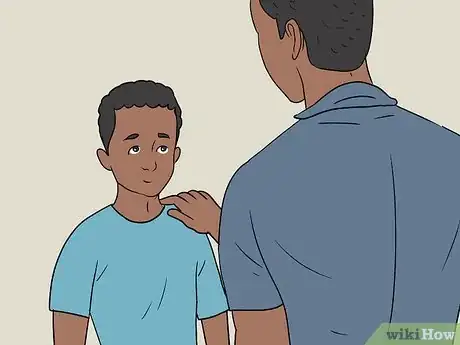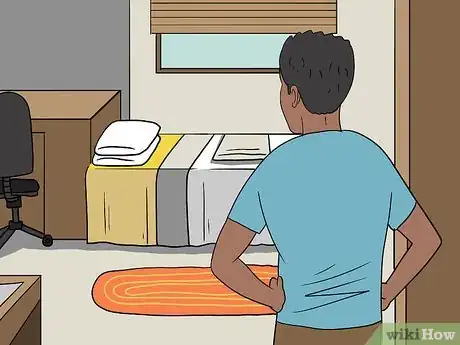This article was co-authored by Kirsten Thompson, MD. Dr. Kirsten Thompson is a Board Certified Psychiatrist, Clinical Instructor at UCLA, and the Founder of Remedy Psychiatry. She specializes in helping patients with mental health conditions such as major depressive disorder, anxiety, ADHD, bipolar disorder, OCD, PTSD, and postpartum depression. Dr. Thompson holds a BS in Operations Research Industrial Engineering from Cornell University and an MD from The State University of New York, Downstate College of Medicine.
This article has been viewed 188,909 times.
If you're still living with your parents, you probably agree with the assessment that punishments are a pain, and you'd like to get out of them at all costs. The easiest way to not be punished is, of course, not to do something wrong in the first place and thus avoid incurring your parents wrath. However, everyone makes mistakes, and you will find yourself in trouble at some point. If you do, this article will help you try to talk your way out of a punishment or at least lessen the sentence.
Steps
Bargaining with Your Parents
-
1Be respectful. Being respectful will help keep you from receiving punishments in the first place, but if you find yourself in hot water, stay calm and polite. The more you yell, the madder your parent is going to be. The madder your parent is, the more severe your punishment is likely to be.
- Never insult your parents. Calling them names will land you in more trouble than it's worth, and you'll regret doing it later. If you feel like flinging an insult, count to 10 before speaking, and take a few deep breaths to calm yourself down.
-
2Apologize for your mistake. This tactic is the most obvious one for avoiding punishment, but it will not work repeatedly on a single rule you have broken, nor will it work if you are disingenuous about it. If you cannot apologize truthfully and sincerely, don't waste your time. Your parents will spot your insincerity, and it will probably work against you rather than in your favor.
- For instance, you could say something like, "I'm really sorry I stayed out past curfew. I know you worry when I'm not home on time, and I really will try to be home on time in the future."
- Pay attention to your tone and expression (body language). Don't smirk when you are apologizing, and don't mumble through the apology. Mumbling says you are just trying to get through it, and you aren't owning up to what you did. Speak in a clear voice that shows you really are sorry.
Advertisement -
3Ask for a cool down. If everybody is angry, including you, ask your parents if you can wait until everyone has calmed down to talk about your punishment. You may receive a lesser punishment or no punishment at all if you give your parents a chance to calm down and think about how severe your crime was.[1]
-
4Leave the past in the past. Dragging past punishments and mistakes--your parents, your siblings, or your own--into the present will only make people more upset, and it may even remind your parents that what you did this time was not your first time to make that mistake. Rather, stay on topic.[2]
- For instance, saying "But Marcie didn't get in trouble when she stayed out too late!" will not endear you to your parents. You and your sister are different people, and your parents are doing what they think is best.
-
5Show you're truly sorry by fixing what you can. If your broke something, try to replace it or fix it. If you made a bad grade, try to make it up. Not everything can be fixed, as sometimes the things you break will be people because you were mean to them. However, you can try to find a way to show your love by being extra nice to the person you hurt or by doing something nice like making her a card.
-
6Offer alternatives to the punishment. Sometimes, this suggestion won't work. Punishment is not supposed to be pleasant. However, sometimes you may be able to offer an alternative to a punishment your parent decides on. Maybe instead of being grounded, you could be spanked or do some extra chores instead. You could offer to do something to help in your local area or community, like helping out at the library everyday after school. Your parent may be amenable to this suggestion because you are doing something for others and not just thinking about yourself. If you offer a punishment ahead of your parent deciding on one, you may be able to sway his or her decision.
- If you do offer an alternative punishment and your parent accepts, make sure you follow through with it. Otherwise, this option won't be available to you in the future because your parents won't trust you to do what you say.
-
7Let your parents know that you want to work with them rather than against them. That is, don't argue against them. Let them know you are aware you made a mistake, and you want to cooperate with them to do better. See if you can work with them to put together a plan of how you can avoid the same mistake in the future. Asking them to make a plan with you will show them you are sincere about doing better.[3]
- Try saying something to this effect: "I know I was late for school again. Do you think we can sit down and talk about how I can manage my time better? I always feel rushed in the mornings, and I can't seem to get myself together."
-
8Use logic, not emotions, when trying to bargain for a lesser punishment. Yelling "It's not fair!" is not likely to help your case. However, offering up a reasonable explanation about why you deserve a lesser sentence than the one being offered is likely to be better received. If your parent can understand why you made the mistake you did, he or she might be willing to lessen the punishment. Your parent may even be willing to let you off the hook if you had a very good reason for why you did what you did. Even if you don't receive a lesser sentence, your parent will respect your maturity.[4]
- For instance, if you stayed out past curfew, you could say, "I know it was wrong of me to stay out past curfew, but I ran out of gas on the way home. I know that I should plan ahead, and I'll try to not be in this situation again. Do you think maybe we can skip the punishment this time?"
- Approach the discussions with tact.
-
9Use all your tools. That is, after everyone has cooled down, be extra affectionate towards your parents, offering hugs and kisses.
Getting Off Early for Good Behavior
-
1Accept your punishment without complaint. By being willing to accept your fate, even if you did not do it, you make them more receptive to not punishing you as much next time, as well as maybe letting you off early this time.
-
2Understand where your parent is coming from. Your parent doesn't just want to make you unhappy by punishing you. They want you to a learn that you are doing something wrong so that you don't make the same mistake next time. Your parent has experience you don't, so he is trying to help you avoid the consequences that could happen to you if act in that way as an adult. Once you show you understand why your parents are punishing you, they may be willing to let you off early.[5]
-
3Realize your parents are not perfect. They may have been a little harsh in their punishment and may regret it later. If you are on your best behavior, they may let you off for good behavior.
-
4Start your homework without being asked. Show your parents that you are willing to work extra hard to please them and to do the right thing.
-
5Pick up extra chores. Similarly, your parents will notice if you are working extra hard to be good. They'll appreciate you helping out around the house, which may make them more receptive to letting you off the hook.
- Additionally, the more you complain, the more your parents will know you hate the punishment, meaning it's the perfect punishment for them to choose the next time you get in trouble.
-
6Show you have learned your lesson. Write a letter detailing how you will do better in the future, and behave in a way that clearly shows you are trying to do better. For instance, if you were grounded for getting in a fight with your sister, try being extra nice to her to show you understand the problem.[6]
- For example, if you stayed out past curfew, you could write a letter that says the following: "Dear [parents], I realize now that I should have called when I was out so late. Staying out too late was bad enough, but then I made you worry by not letting you know where I was. I know you love me and want to keep me safe, and I really do appreciate how concerned you are about me. In the future, I'll try to be more considerate of your feelings in all situations, and let you know where I am no matter what. Love, Jessie"
-
7Politely ask to be let off for good behavior. After accepting your punishment for at least several days (though a week is better for longer punishments), you can ask to be let off early from your punishment. If your parent has seen you've learned your lesson, they may relent and stop the punishment.
- Remember not to demand to be let off. You are making a request, which means your parents have the option to say no. Also, be specific. Say something like "Mom, can I talk to you? I know getting behind on my school work was wrong, and I have learned my lesson. I think you may have noticed that I've gotten all my homework done early this week, and I've abided by your punishment. Do you think you could please let me off a little early so I can see Julie this weekend? I have already done my homework for next week."
Avoiding Punishments in the First Place
-
1Be respectful. One key to any good relationship is respect. You respect your parents by following their rules and being polite when communicating with them. They respect you by allowing you to grow into who you are going to be, as well as by offering correction when you do something wrong.
-
2Be tidy. Cleaning up after yourself is another way to show your respect. Your parents work hard to make a home for you, and they're probably tired when they come home. You should acknowledge that by not leaving messes around and by cleaning up your room even before you're asked.
-
3Be timely about chores. Kids not doing chores on time is a common source of irritation for parents, which is why the phrase "How many times do I have to tell you?" is a mantra for many of them. If you wait until the punishment is imminent, it may be too late, but it doesn't hurt to jump up, grab the garbage bag, and head out to garbage can, even when your parent is already angry.
- Take care of the tasks you normally leave to your parents, such as washing your clothes or dishes and making your food.
- Develop a more mature relationship with your parents by sharing responsibilities, intermittently cooking meals for the entire household, or taking on projects in the house.
-
4Tell the truth. You may be tempted to wriggle out of a punishment by telling a lie. However, lies have a tendency to build. That is, if you tell one lie, you'll likely need to tell more to cover up your previous one, which means digging yourself into a deeper hole. Just tell the truth. Express your regret, and accept the punishment if it happens. If your parents found out you lied on top of doing something else wrong, your punishment will be even more severe.
-
5Keep your grades up. Do your best, and usually, your parents will understand the grade you receive. If you fall behind, try to catch up. If you fail to study for a test, you won't be able to change the grade you receive. However, if you do flunk a test, you may be able to do a makeup test or extra credit work to change your final score. Most parents will forgo the punishment if you can improve your grade.
-
6Keep the peace. Try not to fight with your parents or siblings, as arguments will land you in trouble. Additionally, yelling will stress out your parents, making them more likely to hand out punishments for minor infractions.
Expert Q&A
-
QuestionHow should you handle conflict between you and your relatives?
 Kirsten Thompson, MDDr. Kirsten Thompson is a Board Certified Psychiatrist, Clinical Instructor at UCLA, and the Founder of Remedy Psychiatry. She specializes in helping patients with mental health conditions such as major depressive disorder, anxiety, ADHD, bipolar disorder, OCD, PTSD, and postpartum depression. Dr. Thompson holds a BS in Operations Research Industrial Engineering from Cornell University and an MD from The State University of New York, Downstate College of Medicine.
Kirsten Thompson, MDDr. Kirsten Thompson is a Board Certified Psychiatrist, Clinical Instructor at UCLA, and the Founder of Remedy Psychiatry. She specializes in helping patients with mental health conditions such as major depressive disorder, anxiety, ADHD, bipolar disorder, OCD, PTSD, and postpartum depression. Dr. Thompson holds a BS in Operations Research Industrial Engineering from Cornell University and an MD from The State University of New York, Downstate College of Medicine.
Board Certified Psychiatrist Give yourself the time and space to calm down and analyze your immediate emotional reaction. Also, consider the situation from the other person's point of view. It will help you to approach the conflict from a more logical and productive standpoint at a later time.
Give yourself the time and space to calm down and analyze your immediate emotional reaction. Also, consider the situation from the other person's point of view. It will help you to approach the conflict from a more logical and productive standpoint at a later time. -
QuestionWho should you ask for the best advice?
 Kirsten Thompson, MDDr. Kirsten Thompson is a Board Certified Psychiatrist, Clinical Instructor at UCLA, and the Founder of Remedy Psychiatry. She specializes in helping patients with mental health conditions such as major depressive disorder, anxiety, ADHD, bipolar disorder, OCD, PTSD, and postpartum depression. Dr. Thompson holds a BS in Operations Research Industrial Engineering from Cornell University and an MD from The State University of New York, Downstate College of Medicine.
Kirsten Thompson, MDDr. Kirsten Thompson is a Board Certified Psychiatrist, Clinical Instructor at UCLA, and the Founder of Remedy Psychiatry. She specializes in helping patients with mental health conditions such as major depressive disorder, anxiety, ADHD, bipolar disorder, OCD, PTSD, and postpartum depression. Dr. Thompson holds a BS in Operations Research Industrial Engineering from Cornell University and an MD from The State University of New York, Downstate College of Medicine.
Board Certified Psychiatrist First, you should seek advice from someone you trust has your best interest in mind and will be honest with you. Second, consider the experience this person may have with your situation.
First, you should seek advice from someone you trust has your best interest in mind and will be honest with you. Second, consider the experience this person may have with your situation. -
QuestionWhat if my parent says my apology means nothing?
 Community AnswerIf you did it in the heat of the moment, maybe they still need some time to cool down. Wait a little while and then try to apologize again. Don't try to argue or ask to be let out of your punishment, just apologize, promise it will never happen again, then give them some space.
Community AnswerIf you did it in the heat of the moment, maybe they still need some time to cool down. Wait a little while and then try to apologize again. Don't try to argue or ask to be let out of your punishment, just apologize, promise it will never happen again, then give them some space.
Tip
- Do something nice for them. Pick flowers for them, or make dinner without being asked.
- Tell your parents you did wrong and you knew better.
- If your parents took your phone or something that's important to you, tell them you are very sorry, and show them in a long letter apologizing.
- Make sure that you never complain-that just gets you in more trouble.
Warnings
- Don't do whatever you did to get punished again. The point is for you to learn the lesson, not repeat the mistake.⧼thumbs_response⧽
- No matter how frustrated you are if your precious thing has been taken away, your parents is not just being overprotective, they are trying to make sure that you have learned the lesson. Your parents strongly hopes that you will have a good life in the future, only this time, without misconceptions or bad behaviour.⧼thumbs_response⧽
References
- ↑ http://www.cyh.com/HealthTopics/HealthTopicDetailsKids.aspx?p=335&np=282&id=2535
- ↑ http://www.cyh.com/HealthTopics/HealthTopicDetailsKids.aspx?p=335&np=282&id=2535
- ↑ http://www.pbs.org/wholechild/parents/getting.html
- ↑ http://www.safeteens.org/relationships/getting-along-with-your-parents/
- ↑ http://www.huffingtonpost.com/2013/03/07/hey-its-ok-if-you-dont-ge_n_2831588.html
- ↑ http://www.cyh.com/HealthTopics/HealthTopicDetailsKids.aspx?p=335&np=282&id=2535




















































































